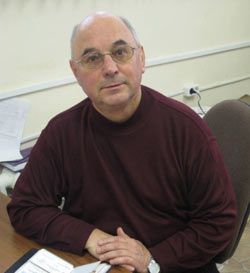The main purpose of this conference was exchange of experience among representatives from participating countries on legal assistance and cooperation between lawyers and human rights defenders in matters relating to the refusal to grant legal aid.
The Conference was attended by representatives from participating countries of the project “Electronic Human Rights Education for Lawyers,” who could share their professional experiences in this matter, as well as experts from Lithuania and Poland.
Experts from Russia, Belarus, Azerbaijan and Georgia presented their country reports, which reflected the problems and difficulties of cooperation between lawyers and human rights defenders. Issues of cooperation between NGOs and lawyers aiming to provide legal assistance were discussed during the conference. Participants of the debate discussed the need for cooperation between lawyers and human rights defenders, issues related to the definition of work ethics of lawyers and human rights defenders.
 “Interaction of lawyers and human rights defenders is a key element in the realization of human rights activities, as human rights defenders often need qualified help in working on the particular case”, – noted the regional project coordinator Volha Ramanenka (left).
“Interaction of lawyers and human rights defenders is a key element in the realization of human rights activities, as human rights defenders often need qualified help in working on the particular case”, – noted the regional project coordinator Volha Ramanenka (left).
The discussants also covered the cases related to various kinds of pressure exerted on human rights defenders and lawyers. Belarusian human rights defenders noted that in the current year almost all lawyers have been pressured by the Ministry of Justice by means of numerous tests and work of evaluation committees. It is known that at least six lawyers were certified only for a year. There have been cases of suspension of the attorney licences. According to Belarusian human rights defenders, the wave of pressure on lawyers had started after December 19, 2010
 Meanwhile, Hary Pahaniayla (right), the head of the legal commission of the Belarusian Helsinki Committee, noted that lawyers, like all citizens of the countries, which guarantee freedom of thought, have the freedom of expression, hence – the right to have political leanings, and no Law on Advocacy, nor the Constitution does prohibit such an approach in the implementation of freedom of opinion and convictions and freedom of association.
Meanwhile, Hary Pahaniayla (right), the head of the legal commission of the Belarusian Helsinki Committee, noted that lawyers, like all citizens of the countries, which guarantee freedom of thought, have the freedom of expression, hence – the right to have political leanings, and no Law on Advocacy, nor the Constitution does prohibit such an approach in the implementation of freedom of opinion and convictions and freedom of association.
“The very participation of the lawyers in the so-called politically motivated cases does not represent the political views of a lawyer. He performs his professional duty of counsel for the defence. Lawyer has the right to move the discussion to the public domain in order to protect human rights and freedoms guaranteed by the Constitution. He can use for this judicial tribune, but sometimes it is necessary to use the media too. For example, his client is sick in a detention facility, where he does not receive adequate medical help. In this case, a lawyer may initiate a public interest in this problem by resorting to the media. But here, lawyers are put under pressure for such actions. We know the state’s attitude to the lawyers who principally use all means and ways to protect their clients. And in this we see a violation of our attorneys’ rights, “- said Hary Pahaniayla.
According to Volha Ramanenka, such exchange of experience between representatives of different countries, which took place at the conference will identify problematic aspects of human rights defenders and lawyers activity, and gradually find ways to solve them.
“Lawyers are forced to work in difficult conditions, when the independence of the Bar and the right to freedom of expression are violated. Lawyers who have been disbarred and in fact denied the right to professional activity, are forced to turn to human rights activities. Yes, now they act as human rights defenders. However, it is very important, because these people can provide qualified assistance on a professional level, “- said Volha Ramanenka.
***
The project “Electronic Human Rights Education for Lawyers“ was created to bring together lawyers from different countries by the use of electronic educational materials prepared by the international and national experts. Now the project is a two-level educational programme, which consists of interactive education for jurists, consultations with experts, preparation of essays and tests, individual reports to UN Human Rights Council and electronic tests.
was created to bring together lawyers from different countries by the use of electronic educational materials prepared by the international and national experts. Now the project is a two-level educational programme, which consists of interactive education for jurists, consultations with experts, preparation of essays and tests, individual reports to UN Human Rights Council and electronic tests.
The “Electronic Human Rights Education for Lawyers” was created to help with e-learning materials produced by international and national experts together lawyers from different countries. Now the project is a two-level curriculum, which consists of interactive training for lawyers, expert consultations, training, and an essay exam, individual communications to the Committee on Human Rights, the UN and electronic tests.
The overall project objective is to improve the quality of protection of fundamental freedoms based on the rule of law, to raise awareness and provide a direct application of international human rights standards.
Related articles
Some political prisoners released but lawyers under pressure
Belarusian lawyers denied licenses
Repressed Belarusian lawyer: “I will continue defending human rights”


